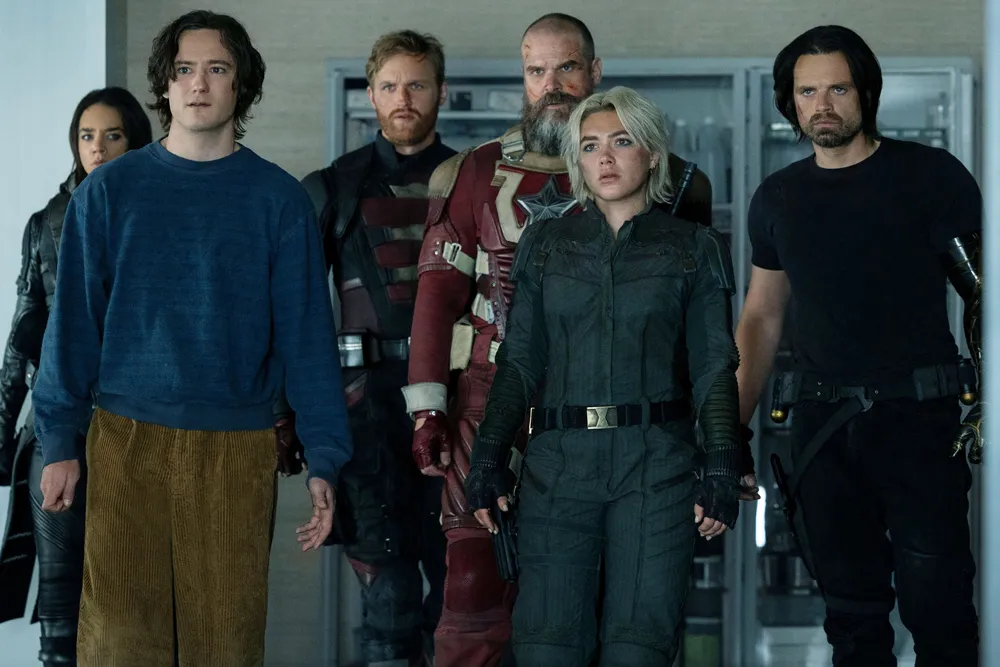A stylishly offbeat twist on the MCU, Thunderbolts turns fringe characters into a surprisingly poignant team of misfits wrestling with trauma, trust—and an asterisk.
In an era when superhero fatigue has all but flattened the cultural buzz Marvel once commanded, Thunderbolts doesn’t so much revive the MCU as reinvent it—from the bottom up. With an asterisk. Literally. The oddly punctuated title sets the tone for a film that’s equal parts chaotic ensemble comedy and melancholic meditation on mental health, and it’s Florence Pugh’s Yelena Belova—dagger-witted, emotionally frayed, and stylishly disillusioned—who anchors this motley crew of second-stringers.
For those still playing MCU catch-up (or just trying to stay culturally literate), Thunderbolts features characters you might vaguely remember, if not entirely understand. These aren’t your typical glossy Avengers. They’re the emotionally haunted, narratively unresolved, and often tragically underpowered “others” from Marvel’s cluttered cinematic attic. But that’s precisely the point. This film isn’t about perfection—it’s about imperfection in designer combat boots.
With Jake Schreier at the helm, Thunderbolts feels more The Breakfast Club meets Flatliners than your standard CGI-blasted superhero flick. Set in a cold and morally ambiguous corner of the Marvel Universe, it opens with bureaucratic queenpin Valentina Allegra de Fontaine (played with icy charm and comedic detachment by Julia Louis-Dreyfus) assigning the group to a mission designed to implode from within. What unfolds is an exercise in reluctant unity, with Pugh’s Yelena, Wyatt Russell’s embattled John Walker, and the spectral Ghost (Hannah John-Kamen) discovering a connection through shared trauma rather than shared purpose.

Enter Bob Reynolds (Lewis Pullman), an amnesiac whose presence raises existential stakes and hints at dark supernatural forces—culminating in the shadowy figure dubbed “The Void,” a villain whose mere silhouette over the Marvel Studios logo in the opening scene is more unsettling than any Phase Four finale. Think less punchlines, more panic attacks; less glory, more ghosts—internal and otherwise.
Marvel’s new edge here isn’t sharper action or multiverse theatrics. It’s vulnerability. These characters are suffering, confused, and painfully aware of their place as the MCU’s “dirty half dozen.” And in that raw emotional territory lies the film’s unlikely appeal. It dares to pose the question: What if saving the world starts with saving yourself?
Florence Pugh doesn’t just carry the film—she elevates it. As Yelena, she gives us a protagonist who is bitter but brave, broken but deeply human. Her arc doesn’t revolve around discovering powers but confronting pain. And in a genre where stoic masculinity and cosmic responsibilities dominate the screen, Thunderbolts feels radically intimate.
The aesthetic is intentionally grungier than past Marvel films—industrial sets, bleak facilities, and washed-out palettes replace neon cities and alien planets. It’s a visual shift that echoes the film’s tone: gritty, uncertain, and just a little off-kilter. Supporting characters like Red Guardian (David Harbour), now reduced to an Uber driver in Soviet cosplay, add comic relief without undercutting the emotional weight. Julia Louis-Dreyfus, meanwhile, nails a pitch-perfect tone of elite absurdity, with Geraldine Viswanathan’s assistant Mel stealing moments of deadpan brilliance.
Is Thunderbolts essential viewing? For die-hard fans, maybe not. But for those seeking something different from Marvel—something messier, more human, and oddly hopeful—it absolutely is. In an era of cinematic excess, Thunderbolts’ real superpower is restraint: fewer explosions, more introspection.
Whether this signals a lasting shift in Marvel’s storytelling remains to be seen. But as a standalone experience, Thunderbolts offers what few MCU entries have in years: the courage to tell a story without guaranteed applause. In that regard, this misfit movie may be just the kind of imperfect hero the franchise needs.


